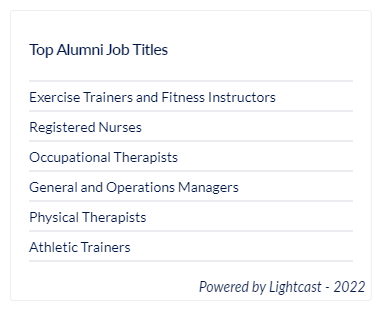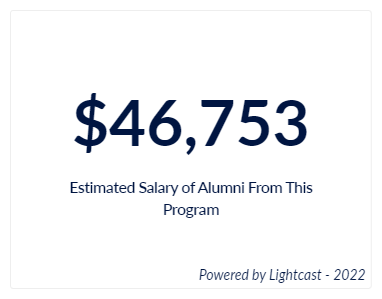Exercise Science, Allied Health Pre-Professional Concentration, BS
If you are passionate about helping people recover from injuries, improve their health and wellbeing, and use exercise as medicine, then the Exercise Science, Allied Health Pre-Professional Concentration, BS is the ideal choice for you. Our program will prepare you for graduate school and a rewarding career in the rehabilitative and allied health professions by helping you develop the knowledge, skills, and abilities that you will need to be successful.
What Will I Learn?
All Exercise Science Majors complete core coursework in exercise physiology, exercise testing and programming, motor behavior, psychology, injury prevention, nutrition, and research methods, which provides a strong foundation for understanding how the body responds and adapts to physical activity and exercise. Students in the Allied Health Pre-Professional Concentration build upon this foundation by taking advanced coursework in biomechanics, medical terminology, and clinical exercise physiology, smoothing your transition into rehabilitation and health care settings.
All students must complete an internship at a career-relevant site of their choosing, such as at an outpatient clinic, school, fitness center, or hospital. Internships are critical for helping students narrow their career options, gain relevant hands-on experience, and develop their professional network. Our students overwhelmingly value their internship experience, and their site supervisors love how excited and knowledgeable our students are. And for students in the Allied Health Pre-Professional Concentration, it is a valuable opportunity to gain observation hours, which are required for entry into most graduate programs.

Meet Kami Holt '20
"Everything you learn can be applied to daily life and a career. You will learn so much that will prepare you for the next chapter of your life."What are the requirements for this degree?
High school students interested in entering the AHPP Concentration upon acceptance into Shippensburg University must meet both of the following criteria:
- Overall high school GPA of 3.40 or better
- Top 50% of graduating class
Current Shippensburg University students interested in transferring from another major (including Exploratory Studies) must meet all of the following criteria:
- Completion of at least 15 credits with a GPA of 2.50 or above
- Completion of ESC 150: Introduction to Exercise Science, with a grade of C or higher
- Completion of one of the following courses with a grade of C or higher: BIO 237 (recommended), BIO 161, or BIO 162
- Meeting with Department Chair
Current non-Ship college students interested in transferring from another university must meet all of the following criteria:
- Completion of at least 15 credits with a GPA of 2.50 or above
- Completion of one of the following courses with a grade of C or higher: Human Anatomy & Physiology I w/Lab (recommended), Biology I or II, Chemistry I or II, or Physics I or II
- Meeting with Department Chair (completed after acceptance, before course registration)
What Types of Careers Could I Get With This Degree?
Careers in the rehabilitative and allied health professions are in demand: the Bureau of Labor Statistics projects growth in these areas ranging from 11% to 31% through 2030. In other words, when you finish your education, jobs will be waiting for you to fill. Students who complete this concentration are prepared for further study and training, largely by attending graduate school to earn a master’s or doctoral degree, in the following areas:
- Physical Therapy
- Occupational Therapy
- Athletic Training
- Chiropractic Medicine
- Orthotics & Prosthetics
- Nursing
- Physician Assistant
Our students have success getting into these graduate programs: a survey of our alumni found that 89% of students who applied to graduate school were accepted. Our program is well-respected in the region, so success with us means that your application will rise to the top.
What Career Outcomes Do Alumni Have With This Degree?


What Kinds of Experiences Could I Have?
The average Exercise Science class has 20 students in it, which means lots of one-on-one interactions with your professors. This allows you to build close relationships with your classmates and faculty that blossom into strong networks as you move forward in your academic and professional life. Our faculty are experts who are dedicated to helping their students succeed both in and out of the classroom.
You’ll spend a lot of time in your courses learning what to do, not just what to know. That’s because we integrate hands-on learning experiences into our entire curriculum. Many class periods will be spent in the Metabolic Analysis Lab, Movement Science Lab, or gym. We have top-notch equipment for testing strength, gait, metabolic functioning, cardiorespiratory endurance, and much more. Knowing how to use this equipment will give you an edge when you apply for graduate school and jobs compared to other programs that are not as applied or practical.
You have many opportunities outside of the classroom, too. All students design and conduct a research study in small groups, and you can even present your findings at regional conferences. We also have two student-run organizations, the Exercise Science Club and Exercise Science Honor Society, that participate in volunteer projects, professional development experiences, and social activities. Our students are highly engaged and connected with each other and the Department, which fosters a positive, constructive learning environment.

